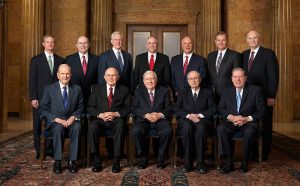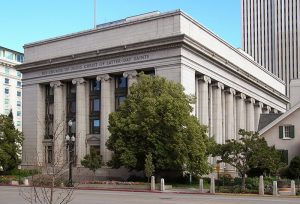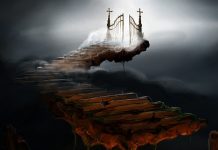
Being ignorant is not so much a shame, as being unwilling to learn. ~ Benjamin Franklin.
I love learning new information. It’s exciting to read that the remains of three ancient Viking settlements may have recently been found in Canada. I’m fascinated to read about revolutionary gene-editing technology that may, someday, be used to fix disease-causing mutations. I was blown away to read that NASA’s Mars Orbiter spacecraft appears to have discovered hydrated salt minerals on the planet which suggest the presence of water.
It was a joy to read that a well-preserved daguerreotype (an early type of photograph) of LDS President Wilford Woodruff from the Nauvoo period showed up on EBay (and was purchased by my friend, LDS photo historian, Ron Fox).
Does the Church have official positions on these, and many more, topics in the news?
That, of course, is a silly question. Why would the LDS Church have an official position on the authenticity of possible Viking settlements, the possible discovery of water on Mars, or an official position on the precise date when the photo of Wilford Woodruff was taken?
“How much do we actually know about ___________?” and we can fill in the blank with nearly anything. How much do we know about consciousness, multiverses, what’s in the oceans, what’s out in space, who were the first humans, or how the brain understands emotions?
The list could go on and on. For the most part, we know a lot more about each of these topics today than we did ten years ago, but we will likely know a lot more in another decade again.
What Do Prophets Know?

When it comes to gospel or doctrinal topics, we tend to think that all prophets knew the same things about every spiritual matter. We assume that past prophets understood the Gospel and Gospel doctrines precisely the same way that 21st century American Latter-day Saints do.
While it’s certainly possible that at least a few things were (or are) universally understood by all past and current prophets, it’s not reasonable to assume that all spiritual perspectives have been understood the same through all ages. Scholarship tells us, for example, that the early Israelites had a polytheistic view of deity (belief in the existence of multiple Gods) while pure monotheism (belief in a single God) didn’t emerge until about the 7th century B.C.
During Christ’s ministry, new teachings were added as the law of Moses was fulfilled.
When Joseph Smith came on the scene, he restored lost teachings but added new revelations that were given for the modern world. After Joseph’s death, even more progress was made. Some of Joseph’s teachings or practices were refined, some practices—such as the United Order and Plural Marriage—were discontinued (for reasons which have not been fully revealed).
The beauty of being a member of the living Church—a Church lead by revelation—is that we can expect, and hope for, changes. “…he that receiveth light,” we read in the Doctrine and Covenants, “and continueth in God, receiveth more light; and that light groweth brighter and brighter until the perfect day” (D&C 50:24).
Questions that Mormons can’t answer now could very well be answerable in the future.
In a Church with revelation, there is no “final word” when it comes to knowing the Gospel. Like secular education, there is always more to come.
What Answers Can We Expect from the Church?
So what does this have to do with “official” answers? Let me explain: For more than two decades I’ve conversed with struggling or former members as they’ve navigated questions for Mormons. Frequently they complain that people such as myself are simply amateur (or “professional”) apologists (an “apologist” is someone who defends a belief), and therefore, my thoughts on the topics can be dismissed.
They want “official” Mormon answers to tough questions.
The topics which some members find troubling include:
- Questions about the relationship between the Book of Abraham as recorded in our scriptures and the Egyptian characters on the Joseph Smith Papyri
- The relationship between what we read in the Book of Mormon and what archeologists tell us about the ancient New World
- The relationship between the scriptural stories of Adam and Eve and what scientists tell us about organic evolution
- The relationship between the nineteenth-century frontier American attitudes regarding folk magic, and Joseph Smith’s methods for translating the Book of Mormon plates
- The difference between Joseph’s understanding of his First Vision as a young man, and his increased understanding of the experience as a seasoned prophet
- The relationship between LDS temple symbols and Masonic symbols of Joseph Smith’s day
- The relationship between Joseph’s restoration of the practice of plural marriage, and man-made practices that confound morality
- The relationship between early nineteenth-century racial beliefs and the priesthood ban for black members
- The relationship between the spirit, the brain, and gender attraction, and traditional man-woman marriage
Among many others.
Critics and some members think that the Church should have official responses or answers for all of these questions for Mormons—or for any troubling issue that may rise upon later reflection, with new discoveries, or during changes in human-relationship dynamics.
Such wishful desires, however, are naïve and unrealistic.
Scholarly Answers are Mormon Answers

First, the overwhelming majority of these issues deal with academic interpretations of data and do not deal with doctrinal problems. For example, the Church teaches that Lehi, Nephi, and their small group of families traveled by boat from the Old World to the New World, practiced their religion, fought with those who challenged their way of life, and wrote about these encounters on metal plates. The official teaching of the Church is that the Book of Mormon is the word of God. The Lord has not revealed any of the historical details about the Book of Mormon people or their lands.
Now we might wish that the Lord would reveal some of the historical peculiarities about the Book of Mormon peoples; we might also wish that the Lord would reveal more details about the timing of the Second Coming or if the deceased can ever progress from one heavenly kingdom to another. We might wish that the Lord would reveal if and when the Holy Ghost will ever receive a body, or how intelligences were made into spirit children. We might wish a lot of things, but the Lord reveals those things which are necessary to guide us to become like Christ and return to the Heavenly Family. For right now there are questions Mormons can’t answer.
If there is no revelation that locates the site of Lehi’s landing in the New World, if there is no revelation which tells us that the entire pre-Jaredite New World was void of all other human inhabitants, if there is no revelation which tells us the precise chemical composition of the Book of Mormon plates, then the answers cannot be found in official revelatory declarations by Church prophets—they can only be found through academic examination and discourse.
If we look at the other “troubling” issues, we find the same contingency. We believe that the Book of Abraham contains the Word of God, but we have no revelation how (or by whom) the Abrahamic stories—as revealed to Joseph—were first recorded. We have no revelation as to the nature of any connection that exists between the Joseph Smith Papyri and the revealed text in our scriptures.
While we know that the Book of Mormon and other modern scripture were revealed to Joseph by the Power of God, we have no revelation that tells us how Joseph’s seer stone worked as a tool to receive scriptural revelations.
While we know that Joseph restored the practice of plural marriage, we have no revelation as to how the practice was fully implemented in Joseph’s day or how this practice interplays with family dynamics in the hereafter.
While we know from revelation that God created the Earth and humankind, we do not have revelation which tells us the how long the process took or what methods God employed.
We know from Joseph’s own testimony that God and Christ visited him in a grove of trees in answer to Joseph’s pleas for spiritual help. We have no revelation that tells us precisely how Joseph was able to see divine beings while he, himself, remained in the flesh. And we have no revelation which tells us what Joseph understood about God or the Gospel when he left the grove of trees or the precise timeline in which each of his additional gospel insights was revealed to his own mind.
While black members of the Church were indisputably denied the priesthood from some point in Brigham Young’s day until 1978, we have no revelation as to why Brigham implemented the practice or even if his move to halt the practice was based on personal feelings, environmental pressures, or cultural proclivities.
While the issue of same-gender attraction has impelled the Church to make official responses addressing the earthly practice of temple marriages and the problem of sexual interactions outside of the bonds of marriage, we have no revelation telling us why a number of our faithful brothers and sisters are attracted to the same gender or how such attractions interplay with family dynamics in the hereafter.
While it’s always possible that we, in mortality, may receive revelation on these and other troubling topics, the fact is that the Lord does not give us answers to everything. Why?
Why Can’t I Make Sense of Conflicting Ideas and Information?
Some of His reasons may not be discoverable through human intellect and logic. We must also remember that mortality is a testing ground where we are required to figure things out on our own. Failure and getting things wrong is part of the process of figuring things out. Dead ends, false starts, and wrong turns are all part of life’s experience and all part of what eventually makes righteous humanity move forward. Our personal accountability lies not so much in the mishaps and stumbles, but rather in the direction we are moving and if that direction is helping us become more like Christ.
So in the absence of revelatory answers we have no choice but to turn to academic answers. Some of those answers could be right, and some could be wrong. Some may be spot on, and some may be in the general area of “correct,” but could use additional tweaking. And when we must turn to academic answers the playing field is open to all those who would share their thoughts. There are experts with degrees in archeology, anthropology, genetics, and history—and they can all add their thoughts and ideas to the discussion—but we must not overlook the non-experts. As Hugh Nibley said, this is the Day of the Amateur1, and a wide array of voices have contributed to the discussions.
The Brethren are aware that many of these topics have proven to be stumbling blocks for testimonies. Fully mindful that we seek learning “by study and also by faith” (D&C 88:118), the Church produced nearly a dozen academic essays which address some of these topics. Elder Ballard, in a recent address to those involved in the Church Education System, strongly recommended that teachers study these essays so that they would have Mormons answers to tough questions from struggling students. 2
The fact that these essays are posted on the official Church website at LDS.org suggests that these are “official” answers by the Church and should silence those critics who claim otherwise. But it’s important that we go beyond the one-dimensional label of “official” as something posted on LDS.org. Some people equate “official” with “doctrinal,” and in human language, words can mean more than one thing. Sometimes an official statement from the Church constitutes official doctrine; sometimes an official statement characterizes the current position as agreed upon by leaders of the Church as a human-administered organization.
The essays satisfy the requirement for “official” answers, but it’s important to understand that they do not represent official LDS doctrine. They are academic examinations of the issues.
Academic answers can change—they can be right, they can be wrong, or they may need to be modified upon the discovery of additional information.
Which brings us back full circle to the beginning of this post. . . . Learning will continue.
There will Always be Questions for Mormons Just Out of Reach
 There is, for mortals, no end to what we might learn. More information—either by revelatory or secular means—will continue to come. Anything that is “official” today can be updated with additional academic or spiritual inspiration.
There is, for mortals, no end to what we might learn. More information—either by revelatory or secular means—will continue to come. Anything that is “official” today can be updated with additional academic or spiritual inspiration.
Our Church doesn’t have creeds (authoritative formulas or statements of religious beliefs). The closest thing we have is the Thirteen Articles of Faith, which outline some of the basic tenets of our faith. As Article 9 states, however, “We believe all that God has revealed, all that He does now reveal, and we believe that He will yet reveal many great and important things pertaining to the Kingdom of God.”
Joseph said that he didn’t like creeds because they set limits. “Hitherto shalt thou come, and no further,” said Joseph, quoting Job 38:11. A Church that believes in continuing revelation automatically believes that what is “official” today may not be “official” tomorrow.
As members of the living Church, we should rejoice is knowing that while the Lord is in charge, He allows us our humanity. He doesn’t force-feed us with truth, but He allows us to discover truth.
As LDS scientist, Henry Eyring once wrote: “In the long run, the truth is its own most powerful advocate. The Lord uses imperfect people. He often allows their errors to stand uncorrected. He may have a purpose in doing so, such as to teach us that religious truth comes forth ‘line upon line, precept upon precept’ in a process of sifting and winnowing similar to the one I know so well in science.” 3
Insisting on official answer answers for everything is a cheap and easy approach that superficially appears to provide comfort, but is nothing more than an information inhibitor.
The Gospel is not a Wikipedia where we can find the final answer to every intellectual or spiritual issue that might pop up in our lives. The Gospel is a more like a co-operative school where we help others while helping ourselves to become—intellectually, spiritually, and physically—like our Father in Heaven. Turning to the back of the book for every answer is like looking up the answer for a math test; it may provide the correct solution, but doesn’t teach us how to do the math.
The other problem with pat answers is that too many people fall into the trap of thinking that the answer book is finished, closed, and that the answers can’t change or be updated.
Thou fool, that shall say: A Bible, we have got a Bible, and we need no more Bible…. Wherefore murmur ye, because that ye shall receive more of my word? …And because that I have spoken one word ye need not suppose that I cannot speak another; for my work is not yet finished; neither shall it be until the end of man, neither from that time henceforth and forever (2 Ne. 29: 6-9).
As truth seekers, we can’t be fully content in limiting our learning with the hopes of official answers for every question. Instead, we will find our hearts and minds contented by putting our faith in God that He has more light yet to share, by trusting God that there are always answers to difficult issues even if we don’t necessarily see them, and by recognizing that, in the words of Hugh B. Brown, “revelation does not come only through the prophet of God nor only directly from heaven in visions or dreams. Revelation may come in the laboratory, out of the test tube, out of the thinking mind and the inquiring soul, out of search and research and prayer and inspiration.” 4
_______________________________
show/hide footnotes






